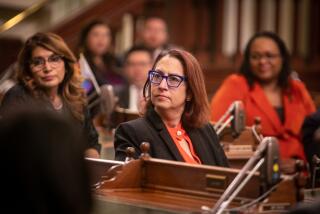Henry Waxman, the ‘tougher than a boiled owl’ congressman
Most members of the House of Representatives have a “wall of fame” in their office — meant-to-impress photographs of the often obscure incumbent with presidents, senators and hometown sports heroes.
Henry Waxman’s wall has bills, dozens of them — bills he helped turn into law, along with the pens that six presidents used to sign them, going back to Jimmy Carter.
There’s the Drug Price Competition and Patent Term Restoration Act of 1984, which virtually invented the generic drug industry (Ronald Reagan signed that one). There’s the Nutrition Labeling and Education Act of 1990, which put the now-familiar nutrition label on food products (George H.W. Bush). There’s the Food Quality Protection Act of 1996, which reduced pesticide residue on fruits and vegetables (Bill Clinton). There’s the Affordable Care Act of 2010, which launched Obamacare (Barack Obama).
PHOTOS: How the Democrats can win back the House and keep the Senate -- in 6 steps
And many, many more. The official summary of Waxman’s legislative achievements runs for 28 pages. “Fifty percent of the social safety net was created by Henry Waxman when no one was looking,” President George W. Bush’s Medicare director, Tom Scully, once said.
That’s why so many Democrats saw Waxman’s announcement last week that he will retire, after 40 years representing Los Angeles’ Westside, as the end of an era. And it’s also why, when House Republicans learned of his retirement at their retreat last week, they burst into applause.
Waxman isn’t a household name in most of the country; he rarely appears on television, unless you count C-SPAN. But he’s an acknowledged master of Congress’ inside game, a tireless author of bills, negotiator of deals, convener of hearings and issuer of angry letters.
And he’s “tougher than a boiled owl,” in the half-admiring assessment of former Sen. Alan Simpson (R-Wyo.).
Born in the once-Jewish neighborhood of Boyle Heights when Franklin D. Roosevelt was president, Waxman got into Democratic politics as a student at UCLA and an admirer of Gov. Pat Brown, the current governor’s father. He’s still an unapologetic liberal who thinks the answer to most of America’s domestic ills is a bigger, smarter, more activist federal government.
“Government is the way we all get together collectively to do things for the public good,” he told me in his big corner office overlooking the Capitol on the afternoon he announced his retirement. “The way we are protected from abuses in the marketplace is to have the government act as a referee so that people play fairly. If that stops, greed will take over.”
He said he’s proud of his role in bringing the Affordable Care Act into existence, despite the program’s chaotic rollout. If anything, he said, the law doesn’t go far enough.
“Maybe it would be helpful to have a public option, a Medicare kind of option,” he said, reviving a proposal he made in the early stages of the Obamacare debate.
His greatest regret, he said, has been Congress’ failure to pass sweeping climate change legislation.
“The president can still do regulation,” he said, but “I would have rather had the Congress act.”
Then why is Waxman leaving the House, with so much of his agenda still undone?
“I am not leaving out of frustration with Congress,” he said — although he acknowledged frustration with tea party Republicans, whom he described as “extremists … who believe compromise is a dirty word.”
Nor, he insisted, is he leaving because he doesn’t think his party can regain a majority in the House — although it’s difficult to imagine that Waxman would leave if he thought a Democratic victory were likely, since that would give him another chance to pass climate change legislation.
Rather, Waxman said, it’s simply that after 40 years, at the age of 74, it is time to try something new.
But he did acknowledge one more reason: the burden of raising money to campaign. Before 2012, Waxman cruised to victory every two years with more than 60% of the vote, and usually raised more money than he spent. But in 2012, after redistricting put more Republicans in his district, Waxman spent $2.7 million, almost twice as much in as his previous campaign, to win only 54% against a wealthy opponent.
“Now I don’t have to spend any time raising money,” he said with a broad grin.
“The most important systemic change we need is [campaign] funding,” he said. “When I first ran for the state Assembly, I think we spent $50,000…. Now, if someone’s thinking about running for office, they’re not asked what their views are or what they’d like to accomplish; they’re asked how much money they have.”
Waxman says he doesn’t plan to abandon Washington and move to Malibu. Instead, he hopes to find a way to help his Democratic successors in the House be more effective. “Probably the best value I could have is to stick around and speak as a wise man who knows how things are done,” he said.
“People are saying such nice things about me, I feel as if I’m at my own funeral,” he said. But his opponents may be in for a disappointment: “I’m alive!”
Twitter: @DoyleMcManus
More to Read
A cure for the common opinion
Get thought-provoking perspectives with our weekly newsletter.
You may occasionally receive promotional content from the Los Angeles Times.











